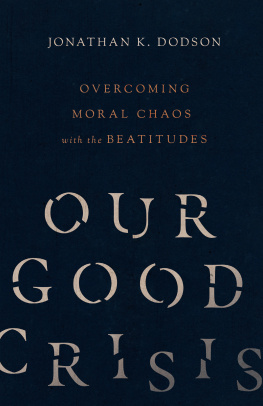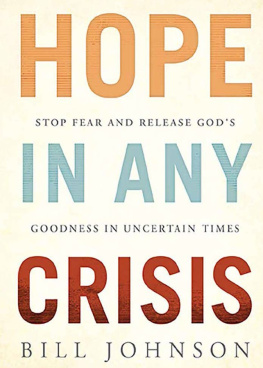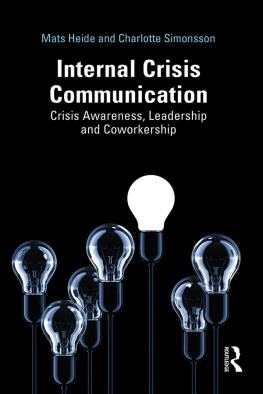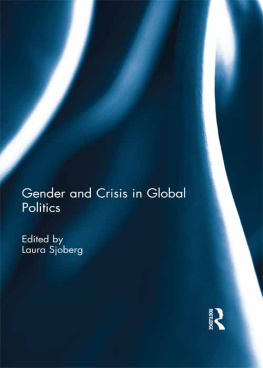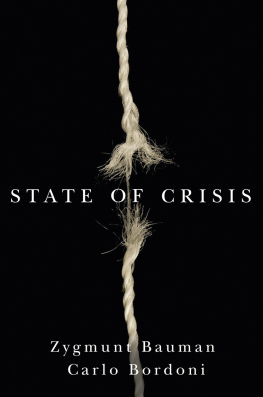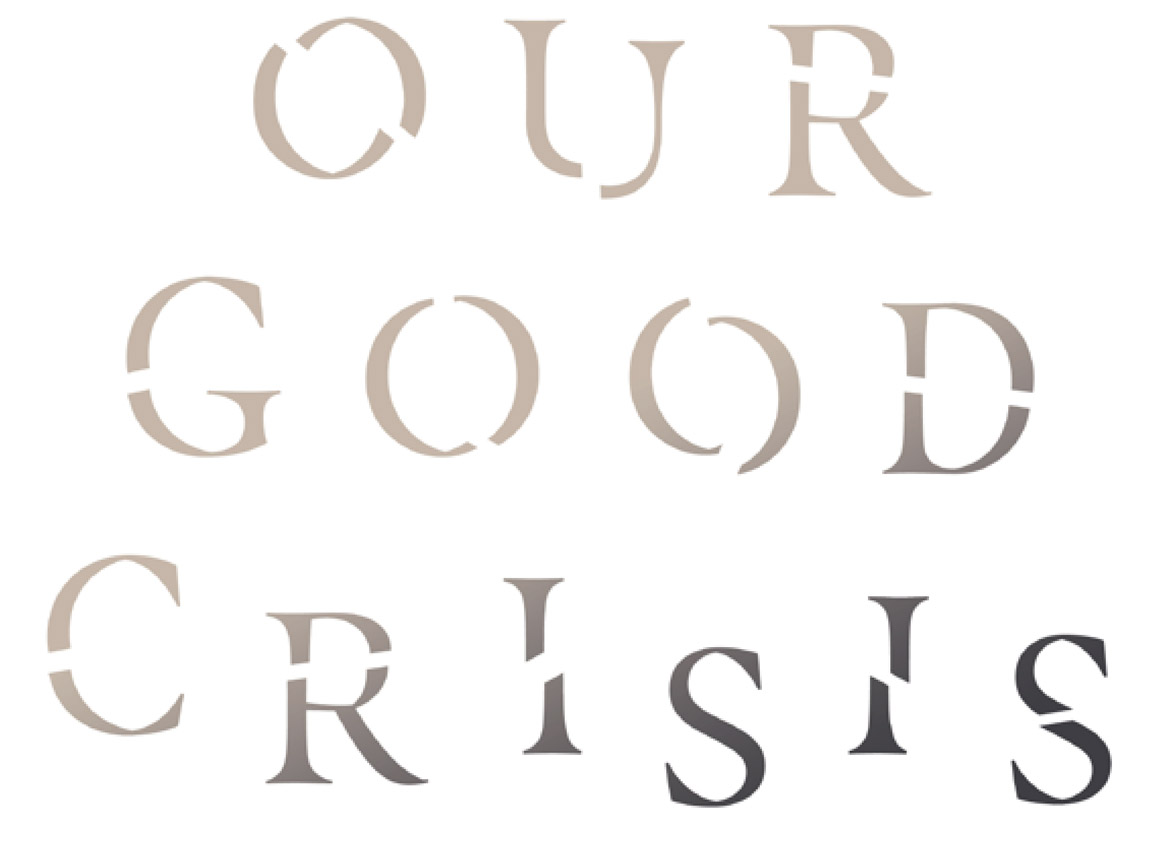Sommaire
Pagination de l'dition papier
Guide
OVERCOMING
MORAL CHAOS
WITH THE BEATITUDES
Jonathan K. Dodson
InterVarsity Press
P.O. Box 1400, Downers Grove, IL 60515-1426
ivpress.com
2020 Jonathan K. Dodson
All rights reserved. No part of this book may be reproduced in any form without written
permission from InterVarsity Press.
InterVarsity Press is the book-publishing division of InterVarsity Christian Fellowship/USA, a movement of students and faculty active on campus at hundreds of universities, colleges, and schools of nursing in the United States of America, and a member movement of the International Fellowship of Evangelical Students.
For information about local and regional activities, visit intervarsity.org.
Scripture quotations, unless otherwise noted, are from The Holy Bible, English Standard Version,
copyright 2001 by Crossway Bibles, a division of Good News Publishers. Used by permission.
All rights reserved.
While any stories in this book are true, some names and identifying information may have been
changed to protect the privacy of individuals.
Published in association with the literary agent Don Gates of The Gates Group,
www.the-gates-group.com.
Cover design and image composite: David Fassett
Interior design: Jeanna Wiggins
ISBN 978-0-8308-4826-3 (digital)
ISBN 978-0-8308-4600-9 (print)
This digital document has been produced by Nord Compo.
To the Lord of the Beatitudes
D O YOU EVER FIND YOURSELF in a state of existential vertigo? A flurry of issues swarm about us at any moment. How should I vote on gay marriage? Should I use traditional gender categories? What is my role in responding to the #MeToo movement? Should I advocate for security measures at the border? Is my smartphone really changing me? Should we pull down Confederate statues? What is a cultural Marxist? Why is it okay for Adam Levine to rip his shirt off at the Super Bowl and not Janet Jackson?
Many of these issues (and more) are not subjects for mere pundit debate. They touch down in the lives of everyday people. Like the conflicted parents who ask, Should we attend our daughters gay wedding? Or the thoughtful friend who inquires, Should I refer to my friend as They? Or the church member who asks, How should I respond to that church members post?
Questions like these, and our societys polarized response to them, sent me back to school. The apologetics training I received in seminary is inadequate, given the real questions people want answers for today. This is no fault of my seminary; rather, it is a stark reflection of a change in the times.
And yet, there are many things that remain the same. The Word of the Lord is the same forever. Blessed are the meek, the mourners, the righteous, the merciful, the pure, the peacemakers, and the persecuted. These clarifying statements from Jesus possess such moral force they can flatten us like a Tyson Fury KO. But, when absorbed, they produce moral ballast that transforms our character, encourages our communities, renews our churches, and blesses our society. While we are in a cultural crisis, were also in a moment ripe with tremendous opportunity. We can turn the tide, in small and big ways, by demonstrating the goodness of Jesus kingdom.
Just a few minutes spent reflecting on the promises that come attached to the Beatitudes can lift us up like the whirlwind of Gods love in a revival tent meeting: inherit the earth, yours is the kingdom, you will be satisfied, you shall receive mercy, and you shall see God. Jesus himself wants these promises, and his moral goodness, to break in nowin our lives, churches, communities, and countries.
While this book is the fruit of my study and reflection on some of these issues, it is not a work of academic apologetics or biblical scholarship, though I hope it stands up to scrutiny. Nor is it a comprehensive guide in how to counsel those who face these issues, although I hope it is a comfort and a guide. It is something in between, an attempt to imagine the goodness of the Beatitudes breaking into the crisis of our everyday lives. I believe the Beatitudes have the power and wisdom to center us in these dizzying times and bring the change we need.

A FTER SETTLING INTO MY TECH-SAVVY dining booth at JFK international airport, I heard breaking news in stereo. News blaringflat screens scattered throughout the terminal announced CNN had obtained a tape of a conversation between Donald Trump and his attorney Michael Cohen discussing how they planned to buy the rights to a Playboy models story of an alleged affair.
I looked around the terminal, scanning gates and bars filled with TVs. No one paid attention. Not a single person seemed to be concerned that evidence had surfaced indicting an American president of an extramarital affair, with a Playmate, which he tried to cover up by paying her off. Irrespective of political affiliations, this news should grab our attention. Not a head turned.
Why? Perhaps its because weve become so accustomed to public crises. Just this week I came across the vicious ethnic cleansing of Myanmars Rohingya, the massacre of six American women and three children in Mexico, an impudent religious leader hurling racial insults, impeachment hearings in DC, and a college admission scandal. If Im honest, Im kind of overloaded, even numb to these atrocities.
Every time we pick up our phones, were hit with another calamity or scandal. And just when we think we cant process any more, a personal crisis hits.
I picked up the phone and said hello.
Jonathan, this is Amy. I hadnt spoken to my old girlfriend since shed moved to Alaska a decade ago.
Oh, hey, its great to hear from you. How are you doing?
Well, okay. Ive been meaning to call you for a long time. I need to tell you something. When we were dating, I got pregnant and had an abortion. Im sorry I didnt tell you about it. I just felt like it would send you on a different path, away from ministry, so I kept it to myself.
Dead silence.
How do you absorb something like that on the phone? It took me a while to process what her words meant: my sin had led to the end of a precious human life. It had also placed my girlfriend in an awful situation. Clearly it had taken a lot of courage on her part to make this call. Eventually I replied, Im so sorry. I wish I had known so we could have made the decision together.
How would moral fortitude have changed that situation?
More self-control on my part would have made her life radically different. I regret my youthful lust, lack of self-control, and that I wasnt part of the decision she made. I contributed to a situation that led to an abortion. I hate that she had to suffer such a painful decision, alone. She was torn between two acts of compassioncompassion for someone she knew and someone she did not yet know. In what must have been a heart-wrenching decision, she chose me.
If I had been more responsible, Amy wouldnt have had to endure such a tormenting decision and undergo what some women describe as a humiliating procedure. If I had been morally upright, she also wouldnt have dealt with the guilt and shame that followed. I have wept at the thought of this, more than once. I have prayed, and pray even now, she experiences the comfort and forgiveness that only the Father of mercies and God of all comfort can provide, who comforts us in

